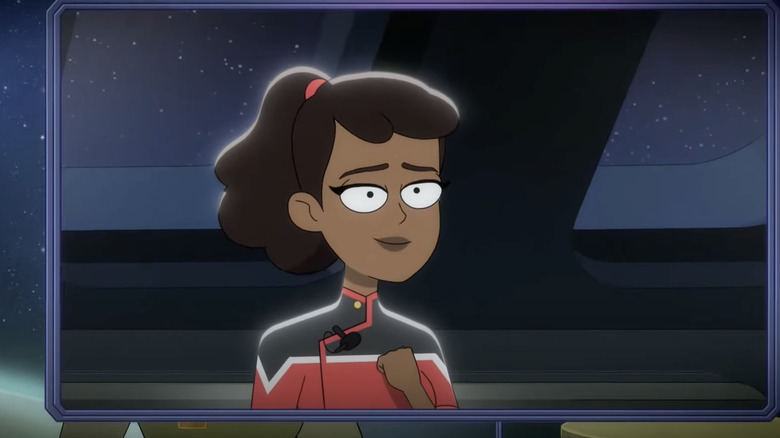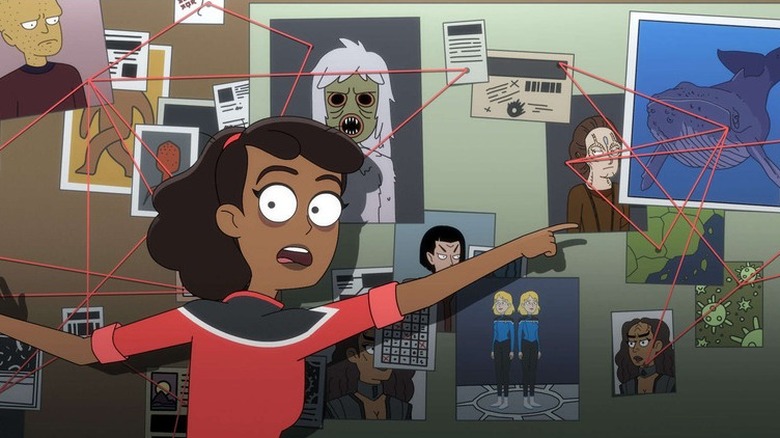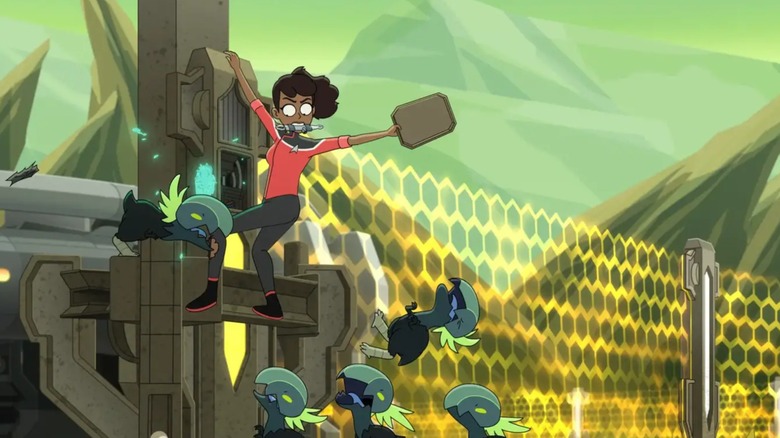It's Official: Beckett Mariner Represents Everything That's Special About Star Trek
This post contains spoilers for the season 4 finale of "Star Trek: Lower Decks."
I remember finishing the pilot for "Star Trek: Lower Decks" and having one overriding thought: "I might be in love with Beckett Mariner."
Okay, well more accurately, I might be in love with voice actress Tawny Newsome, whose charismatic and rambunctious performance, treading the line into sardonic while never being insincere, gives me life in every episode of "Lower Decks" that I watch. That's not to say Mariner depends only on her actress to be a star. She's complex enough to be a real person — even if she's usually just a cartoon — and her contradictions reflect those that make "Star Trek" what it is.
Sure, there are Trekkies out there who think "Star Trek" is only philosophy about the human spirit and morality plays — I do love a good "Darmok" or "In The Pale Moonlight." However, episodes vary back and forth from character melodrama to tense-paced thrillers to action-packed war stories to goofy comedy. Even "Deep Space Nine," the darkest "Star Trek," knew when to loosen up. "Star Trek" is all about exploring a galaxy of possibility — even if those possibilities sometimes look a lot like Earth.
Mariner has traversed through the franchise's history, for good (she has friends all over the galaxy and much more familiarity with alien cultures than her fellow lower deckers) and ill (she fought in the Dominion War). It's fitting how often she guides her friends through the tropes of "Star Trek" because her character reflects the setting like no other.
Rebel with a purpose
The obvious contrast in Mariner's character is that she's so experienced and well traveled, but only an ensign when the series begins (she's had her share of demotions). The sense is that she doesn't have the temperament to climb the Starfleet ladder — in different ways than you might expect. Sure, she's louder and more informal than most Starfleet officers and gets thrown in the brig plenty for it, but she's no selfish lone wolf.
Think back to the pilot, "Second Contact," where she goes against orders to help the locals of planet Galar by delivering Federation-grade farming equipment to them. Her disobedience is guided by a strong moral compass as well as a refusal to suffer indignity. As Commander Ransom knows, you have to earn her affection and respect before she offers it. She values her friends so much that it's the very reason she stays a lower decker; she doesn't want to make command decisions that could cost them their lives. This speech in season 3, episode 9 — "Trusted Sources" — says it all:
"There's a family you're born into, right, and then the family you choose. I've got both here on the Cerritos. If you're measuring by heart, this is the strongest ship in the fleet, because we've got the best captain at the helm — my mom."
Mariner's outlook isn't that different from the other leads of past "Star Trek" shows. Think of all the times Jim Kirk or Ben Sisko violated the Prime Directive or broke the chain of command for the greater good. In the "Lower Decks" season 4 finale, "Old Friends, New Planets," Mariner's mother, Captain Carol Freeman, disobeys orders to rescue her. Mariner is more of a chip off the old block than she often seems.
An action hero and diplomat in one
As for that finale, Mariner spends most of it on her own, trying to dodge pursuers and save the day without her friends by her side. On the Holodeck, she plays the part of bad guy Vindicta, but this finale puts her against an actual villain out to undermine Starfleet: Nick Locarno. It's a fitting foil relationship because Locarno, a former Starfleet cadet, was once like Mariner is now; the charismatic leader of a low-ranked friend group. Only his recklessness got someone killed and he refuses to grow as a person.
Mariner, though, is fundamentally selfless and has only grown more so since we met her back in "Lower Decks" season 1; she refuses to go over to Locarno's side but tries to pull him back from the edge. She doesn't just have the adventurous spirit a starship crew member needs, but also the essential empathy. Starfleet flip-flops between military and explorers, but they're fundamentally about fostering connections. Mariner did just that in the preceding episode, "The Inner Fight," when she helped wrangle feuding Klingons, Romulans, Ferengi, Bynars, Cardassians, and Orions together. Still, the episode's cold open — when she fought off a horde of venomous tremble lizards — reminded us how easily she can kick ass.
Seeing so many different people — and genres — come together is what makes "Star Trek" great. Mariner is the latest lead to bridge these gaps that otherwise shouldn't go together, yet in the end, add up to something beautiful.
"Star Trek: Lower Decks" is streaming on Paramount+.


